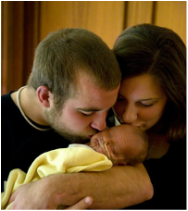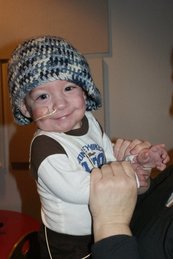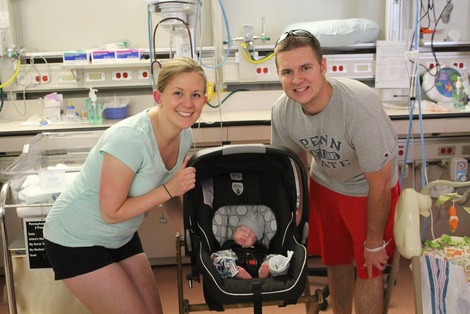 By Elizabeth Payne Leaving the NICU with your baby is exciting and nerve wracking all at the same time. Although this is a time to celebrate- your baby is healthy enough to go home with you!- many parents are scared by the fact that they are moving baby from an environment where they are constantly surrounded by doctors and nurses to one where they usually have only two people watching them. Your baby’s care team will help you make the transition from hospital to home, but the following guide will give you a good general idea of what to expect, as well as suggestions to help ease you into the transition. Preparing to Go Home If your baby was born prematurely, there are several requirements they must meet to be eligible to go home; they must be gaining weight steadily, be able to maintain their body temperature, and no longer require tube feedings; some wards will also require a minimum weight. Most children reach these milestones around their original due date, but this is not a hard and fast rule. Each baby varies and your particular child may be discharged up to a month in advance of this date, or several weeks after. Prior to discharge, your medical care team will come up with a care plan for you and your child, which will detail the special needs your child may have and how to help with them. They will also help you determine your child’s nutritional needs, sleep, eating and medicine schedules and everything else you need to know. Remember, if you’re confused about something or want to know more about it, ask. If your baby requires the use of medical devices at home, the medical team will train you in the use of them before you go home. You may also be trained in infant CPR if your baby has certain breathing problems; if this is necessary, your baby should always have someone trained in infant CPR with them. This means that all caretakers; you, you partner, aunts, uncles, grandparents, family friends, or anyone else who will be alone with the baby for any period of time, should be trained in how and when to perform infant CPR. The medical team will also tell you if you should be on the lookout for any particular behaviors and to react to the. Remember that you can call your doctor any time after discharge if you have any additional questions. Before leaving the hospital, you should pick a pediatrician for your child and meet with them. It is good to establish a relationship with your child’s doctor early on and inform them of any special care they may require. The first appointment with the pediatrician should take place within a few days of discharge. Before leaving, ensure that you have all the paperwork pertaining to your baby’s health in order, preferably in its own file; medication sheets, test results, personal notes, discharge summaries, and names and numbers of doctors and specialists. Keeping this all together now will save you later when you need it.  Help at Home It takes a village to raise a child, and NICU babies are no exception to this. Reaching out for help from family, friends and professionals will benefit you greatly, especially during the stressful first few days at home. Some insurance companies cover the costs of a visiting nurse for new parents, which many parents find great comfort in. Visiting nurses allow you to increase your confidence in caring for your child at home, while also providing a “safety net” and assurance that you’re doing the right thing. However, even if your insurance doesn’t cover this, early intervention programs for NICU graduates will often provide free home visits that will provide you with the same level of comfort (see the early intervention section below for more details). Family and friends are also a great resource during this time. Don’t be afraid to reach out for or accept help. The people who love you understand that you still need help, and there is no shame in respectfully asking them to pick up something from the pharmacy, assist with meal preparation, or help with the household tasks you’ve fallen behind on. This is especially true if you have other children, who are probably feeling ignored in favor of their new sibling; getting help can give you more time to spend with the older kids, or will let you send them out of the house for a playdate and make them feel appreciated while you dote on baby. Early Intervention Programs Early intervention, or EI, programs are designed to help children who have or are at risk for developmental delays. This includes almost all NICU graduates. Your child will be evaluated, and if they meet the criteria, will be referred to an early intervention program. Remember that there is no shame in this and this in no way reflects on you. Your baby just made it through a very tough stay in the NICU and might need a bit more help in the beginning of their life. EI programs can provide myriad free services to your family that can help ease you and baby into life after the NICU, such as home visits, counseling, therapy, support groups, education, and nursing and nutritional services. Visitors Staying cooped up at home without any visitors constantly is stressful for both you and your child. However, you will probably be nervous about taking your little NICU graduate out or having visitors over, and rightly so. Prior to hosting visitors, make sure to lay some ground rules with them, such as washing hands before visiting and again prior to holding the baby, no visits if you’re sick, and that anyone who smokes should shower and change their clothes before coming over. You should emphasize how important it is to keep your home disease free for the safety of your newborn; freely remind visitors that an adult’s little cold can be a big threat to your child, and suggest that school age children and anyone who has a sick person in their household hold off on visits for a while. Also, it is okay to gently remind your guests that your baby is on a schedule and you may need to excuse yourself to pump or feed, or possibly shoo everyone from the room when nap time rolls around. Remind them that although they may want to spend time with the baby, your child’s health is paramount and you little one needs a quiet, clean environment. If your child is seriously immunocompromised, you may be put on quarantine until their system is healthy enough to handle everyday germs. Although this is the best option for your child’s physical health, this might take a toll on your mental health. Just because you are stuck in the house without visitors doesn’t mean you have to be lonely; try to keep in touch with friends through social media, phone calls, e-mails, anything you can think of. Encourage them to contact you and update you on their lives and share news about your family with them. When to Call the Doctor It is better safe than sorry. If you think that there is something wrong or have a question, call your doctor. There are many other resources available for you to use, but most of them don’t have a medical degree and don’t know your baby. You should additionally, with no second thought, call your child’s doctor if you notice that your child has yellowed skin or eyes, has a temperature of over 100 degrees F, has breathing trouble, is difficult to wake up, has blood in their vomit or diaper, or has a seizure. Sources: http://kidshealth.org/parent/pregnancy_center/newborn_care/preemie_home.html# http://www.ahrq.gov/professionals/systems/hospital/nicu_toolkit/nicupacket.pdf http://www.marchofdimes.org/baby/getting-services-for-your-baby-after-the-nicu.aspx http://www.babyfirst.com/en/parents-corner/life-after-neonatal-intensive-care-unit.php http://handtohold.org/resources/helpful-articles/coming-home-from-the-nicu/ |

 RSS Feed
RSS Feed